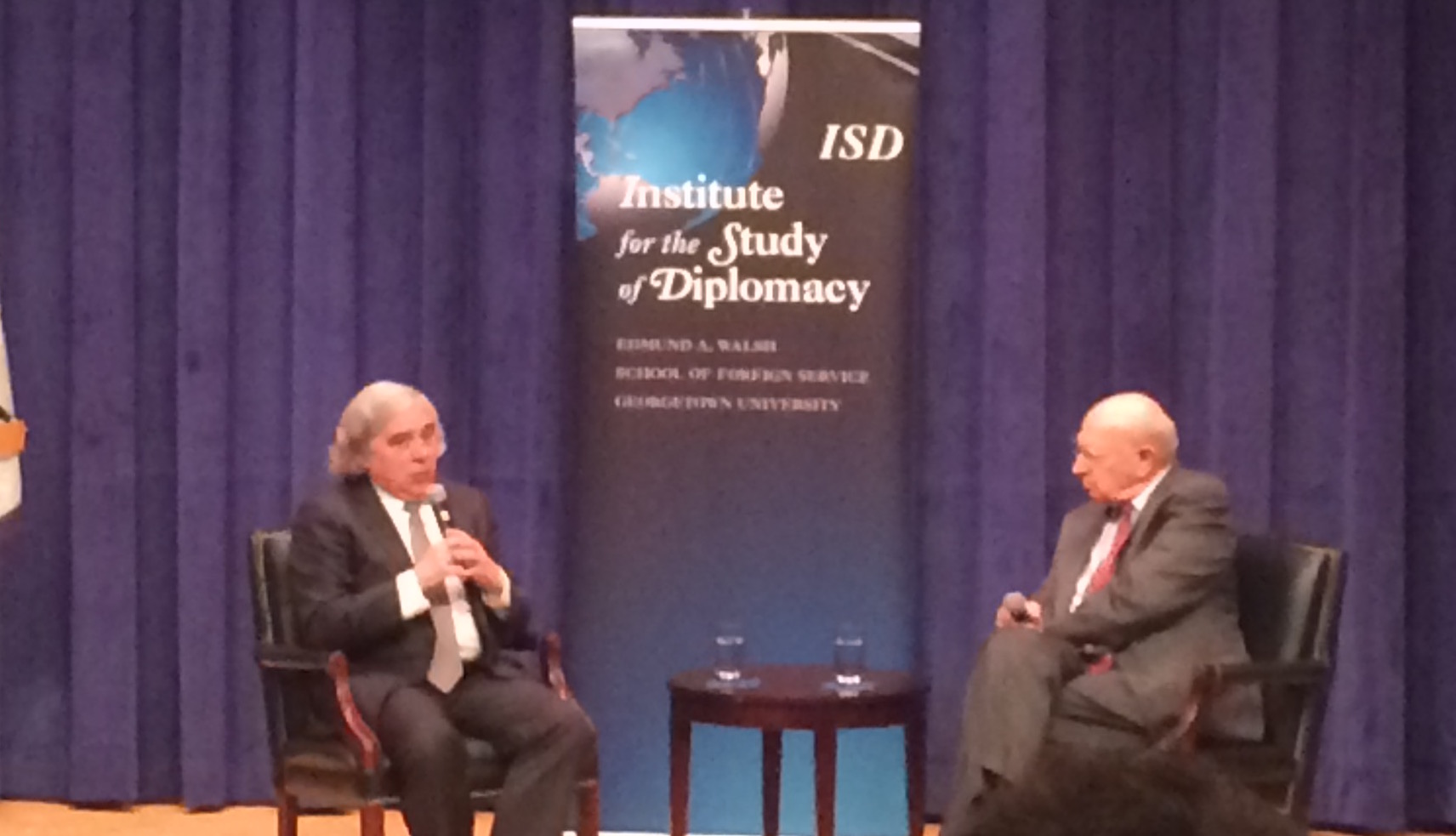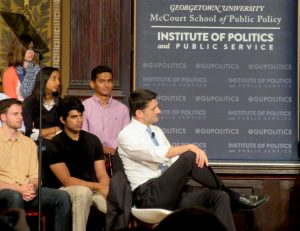Dr. Ernest Moniz, the current United States Secretary of Energy, was honored at a ceremony in the ICC auditorium on Monday, April 11. Georgetown’s Institute for the Study of Diplomacy and the Trustees of the Trainor Endowment granted the Secretary the 32nd “Jit” Trainor Award for Distinction in the Conduct of Diplomacy. Upon receiving the award, Moniz spoke on his experience as Secretary of Energy, particularly his work in regards to nuclear non-proliferation, the recent Joint Comprehensive Plan Of Action, known as the Iran nuclear deal, and the intersection between science and diplomacy.
SFS Dean Joel Hellman gave opening remarks before the Secretary’s speech. Hellman emphasized that the recognition of Moniz with the Trainor Award was a landmark. “You are the first scientist to receive an award for diplomacy at the School of Foreign Service,” he said to Moniz. “I hope you will not be the only scientist to receive an award.”
Hellman elaborated upon the importance of science and scientific knowledge in contemporary international affairs. “Issues such as climate change, energy security, the environment, human security, much less terrorism and nonproliferation– these are the kinds of subjects that demand the rigorous application of science in a multidisciplinary context to achieve successful diplomacy and diplomatic outcomes,” he said.
Hellman tied these remarks to the rise of the STIA major within the SFS, which is now the School’s second most popular major. He acknowledged the unofficial moniker of the SFS, “Safe From Science,” and expressed a hope that in the future, the School will be “Safe For Science.”
Thomas R. Pickering, the former US Ambassador to Russia and the United Nations, introduced Moniz and emphasized the complex nature of the Secretary’s work. “[The Secretary’s job] runs the gamut, from keeping you warm at night in the wintertime and cool in the summer, to the questions of keeping us safe from the possible use of nuclear weapons anywhere around the world.”
Dr. Moniz began his speech by reflecting on the true nature of the concept of diplomacy. Moniz rejected the notion that as a scientist in the world of diplomacy, he is a fish out of water. He maintained that diplomacy is not exclusively the province of professional diplomats.
The topic of the speech became serious as Moniz addressed the recent Iran nuclear deal. “The United States and Iran could not break the negotiating impasse without integrating science and diplomacy more deeply than had been the case up to that point,” he said. According to Moniz, initial frameworks for reducing international sanctions on Iran in exchange for restrictions on its nuclear program fell through, in part because Ali Akbar Salehi, head of Iran’s nuclear program, deemed these proposals unacceptable. As such, Salehi and Moniz became involved directly with the negotiations.
Moniz considered his negotiations and discussions with Mr. Salehi successful. The Secretary emphasized his shared academic experience and understanding with Salehi as a crucial aspect of negotiations. “A relationship of trust was built up at what I would say [was] the scientist-to-scientist level,” he said.
This positive relationship, Moniz noted, was crucial to fostering an environment conducive to discussion. Both Moniz and Salehi “rapidly understood what the requirements were going to be” in order to satisfy both the US and Iran with a potential deal. Ultimately, their goals were achieved; Iran’s “breakout time” to produce a functional nuclear weapon has been restricted to a year, in line with the United States’ preferences. Furthermore, long-term external verification protocols have been applied to the Iranian nuclear program. This allows the Iranian nuclear program to continue its activities (albeit with some restrictions), which is in line with Iranian demands.
The Secretary concluded his remarks by offering three comments on the Iranian nuclear deal. First, he opined that most criticisms of the deal are, in fact, “criticisms of what the deal is not,” using as an example the criticism that it did not stop arms transfers to Hezbollah.
Second, Moniz condemned the potential nullification of the deal. Destroying the current framework would cause Iran to see the negotiating powers involved (China, France, Germany, Russia, the UK, and the US, collectively referred to as the P5+1) as an internally divided entity. It would make another coherent agreement extremely unlikely. He also emphasized the exceptional nature of the agreement, which occurred in spite of tensions between key players, such as the US and Russia.
Finally, Moniz spoke on future challenges. “We do have a challenge of sustaining interest and resources for implementation over many decades,” he said. However, Moniz optimistically suggested that the political situation in Iran will change for the better before this final concern becomes a legitimate issue.
Moniz then sat down for a brief discussion with Pickering. He addressed speculation that the agreement could set a precedent for dealing with countries seeking to develop nuclear programs in the future. “We still would rather see, obviously, enrichment [of uranium] not be spreading in a lot of places,” Moniz said. “The P5+1 are not of a single mind on whether this should be viewed as a precedent.”
Audience members then were given the opportunity to ask Moniz questions to conclude the afternoon’s proceedings. Rachel Rogers (SFS ’16) asked about how to encourage the use of renewable energy sources in developing countries, which are heavily reliant on fossil fuels. Moniz clarified that this is a problem in both developed and developing economies, but offered some cause for optimism. “I think you are seeing that oil dependent economies are beginning to make strong moves on developing alternatives internally,” he said. Moniz also highlighted the feasibility of reduced reliance on oil for electricity production, emphasizing the drop in solar equipment prices that has occurred in recent years.
Moniz concluded by reflecting on the importance of energy for humanity in general. “There are still over a billion people with essentially no electricity at all,” he said. “For them, very often, a very small amount of electricity–tens of watts–can be life-changing.”




